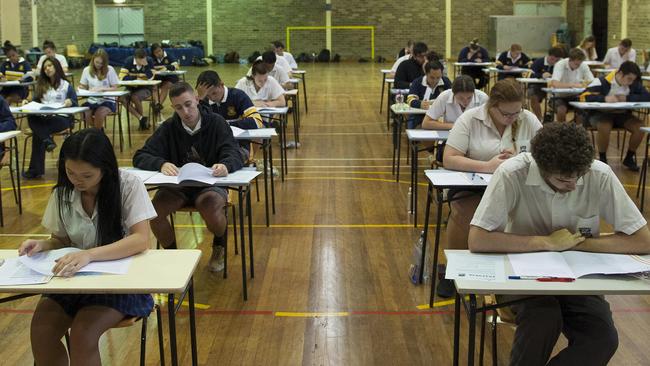Experts say stress is a normal part of VCE
STUDENTS preparing for VCE exams shouldn’t fear stress, but there is a point where too much tension becomes a concern. Now experts have offered their advice and tips for making it to the final exam — and parents are a big part of it.
VIC News
Don't miss out on the headlines from VIC News. Followed categories will be added to My News.
STUDENTS preparing for VCE exams shouldn’t fear stress, but there is a point where too much tension becomes a concern.
More than 85,000 students will sit VCE exams over the next two months, the first written exam being English today.
And as they gear up for the exam period, experts have offered their advice and tips for making it to the final exam — and parents are a big part of it.
WE MUST FIND NEW WAYS TO MEASURE STUDENTS’ GROWTH
INFORMATION FOR PARENTS ABOUT VCE
IS INTERNATIONAL BACCALAUREATE A GOOD ALTERNATIVE
ReachOut chief executive Ashley de Silva said the mental health service had found parents were one of the main sources of stress leading up to exams. He called on them to keep an eye on how their own words and actions affect the way students feel.
“Putting too much emphasis on the outcome can inadvertently cause more stress — they’re already feeling that,” he said. “It’s good to recognise the effort rather than the outcome.”

Orygen Youth Heath clinical neuropsychologist Kelly Allott said communication was the key.
“It is a very stressful time, definitely I would encourage parents to be around as much as possible during exams,” Dr Allott said.
“Having a routine, having a meal on the table, listening to your child if they want a debrief or noticing changes like withdrawal, noticing a change and asking them about it.”
Mr de Silva encouraged parents to ask their children how they were feeling, whether they had a break, whether they were sleeping well, rather than how confident they were about the exam. He said stress was “a normal part of exams”.
“In our experience, it can actually help you focus — it’s not all bad,” he said.
Dr Allott confirmed that research showed people performed better with adrenaline and arousal, but that decreases as anxiety increases.
When this happens students might notice they are “thinking about it all the time, not able to switch off or you have physical signs — your heart is racing, you’re breaking out in sweats, you’re not sleeping well, you’re not able to study or you’re withdrawing from study because you’re so overwhelmed,” he said.

Dr Allott said that if students’ stress gets to this point, they should speak to a trusted relative, friend or teacher — and if that doesn’t help, seek professional help.
Mr de Silva said students should continue to do the things that “nourish” them, including sport, hobbies, study breaks, spending time with family or friends. “Don’t underestimate the benefit of those things,” he said.
And diet was also very important. Mr de Silva said a survey found 45 per cent of young people were less healthy during exams, eating junk food, energy drinks and sugar.
“The reality is those types of food won’t sustain you and will make you crash and burn,” he said. “Stamp out the things that are convenient — instead of a second bag of chips, grab some nuts instead.”
And parents could also support their children in eating well, stocking the fridge with healthy and nutritious food.
More than 43,000 students will sit the English exam — the most popular subject — followed by further mathematics, mathematical methods, psychology then health and human development.
HOW TO GET THROUGH VCE EXAMS
FOR STUDENTS:
— Keep active
— Eat foods that sustain you
— Don’t skip out on the things that relax you
— Take regular study breaks
— Keep an eye on your level of stress
FOR PARENTS:
— Have a routine
— Support healthy eating and have a meal on the table
— Be around more during exams if possible
— Don’t emphasise the outcome, emphasise the effort
— Listen to your child if they want to debrief and watch out for any change in their normal demeanor


